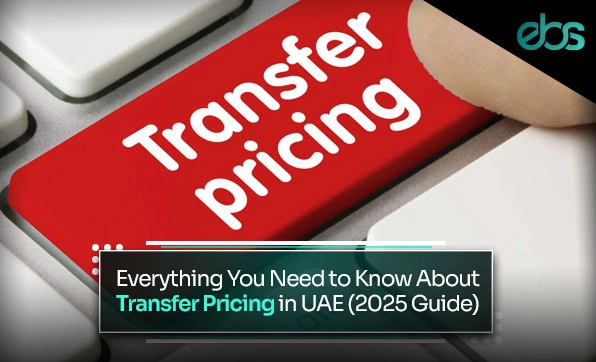Transfer pricing is an essential issue of global taxation that impacts multinational enterprises (MNEs) running inside the United Arab Emirates. With the advent of corporate tax within the UAE, expertise and compliance with transfer pricing UAE guidelines have grown to be crucial for agencies. This manual presents a top-level view of transfer-pricing principles, techniques, documentation requirements, and compliance techniques applicable to the UAE’s cutting-edge regulatory landscape.

Introduction to Transfer Pricing
Transfer pricing includes putting expenses for items or offerings exchanged among associated events inside an institution. The number one intention is to make sure those expenses are truthful and corresponding to the ones charged among unrelated events—called the arm’s duration precept. This precept is important for stopping tax evasion by way of means of making sure that income isn’t artificially shifted from one jurisdiction to every other via manipulated transaction expenses.
Arm’s Length Principle
The arm’s duration precept calls for transactions among associated events to be performed in situations much like the ones winning among impartial entities. This way, if an agency buys substances from its subsidiary, the fee must be much like what it might pay if buying from an unrelated supplier. The OECD hints offer distinct frameworks for making use of this precept throughout numerous transactions.
Transfer Pricing Methods
The UAE acknowledges 5 the world over usual switch pricing techniques mentioned via way of means of the OECD:
- Comparable Uncontrolled Price (CUP) Method: Compares expenses charged in managed transactions with the ones charged in similar uncontrolled transactions.
- Resale Price Method: Determines the arm’s duration fee primarily based on the resale fee minus the perfect gross margin.
- Cost Plus Method: Calculates an arm’s duration fee by means of including the perfect markup over expenses incurred.
- Transactional Net Margin Method (TNMM): Compares internet income margins relative to income or expenses.
- Profit Split Method: Allocates income amongst associated events primarily based totally on their relative contributions.
These techniques assist in making sure of equity and accuracy in intercompany transactions.
Documentation Requirements
To follow UAE Transfer Pricing Regulations, agencies need to hold 3 stages of documentation:
- Master File: Provides a top-level view of world commercial enterprise operations relevant generally for MNE businesses exceeding certain thresholds.
- Local File: Contains distinct statistics approximately on cloth-managed transactions precise to every U.S. state in which operations occur.
- Country via means of Country Report (CbCR): Required for MNE businesses with consolidated sales exceeding AED 3.15 billion; it presents statistics on earnings taxes paid throughout special jurisdictions.
Timely training and preservation of those files are important for keeping off consequences related to non-compliance.
Compliance Strategies
Ensuring Transfer Pricing Compliance UAE includes numerous key techniques:
- Conduct Risk Assessments: Identify capacity dangers related to intercompany transactions early on.
- Maintain Accurate Documentation: Ensure all required files are updated and without difficulty to be had upon request from tax authorities.
- Engage Expert Advice: Consult specialists skilled in navigating complicated switch pricing problems precise on your commercial enterprise structure.
Non-compliance can cause full-size fines and extra tax liabilities because of changes made by tax authorities.
Advance Pricing Agreements (APAs)
The UAE plans to introduce APAs as a part of its switch pricing regime, permitting taxpayers pre-settlement facts concerning their methodologies earlier than moving into complicated or high-price transactions. While methods are nevertheless being finalized, this selection will assist in lessening destiny disputes over intercompany transaction values.
Impact on Businesses Operating in UAE
With corporate tax now applied beginning June 2023, businesses need to adhere strictly to those guidelines:
- Companies concerned in cross-border trades want strong regulations making sure truthful marketplace price-primarily-based totally transfers inside their institution structures.
- Non-compliance dangers consist of audits, mainly due to wrong reporting practices.
- Understanding those regulations enables agencies to keep away from useless headaches at the same time as optimizing their monetary control techniques inside felony frameworks set forth both regionally and globally aligned with requirements just like the BEPS Action Plan.
Summary Checklist:
| Aspect | Key Points |
| Arm’s Length Principle | Prices should mirror open market conditions |
| Transfer Pricing Methods | CUP, Resale Price Method, Cost Plus Method, TNMM & Profit Split |
| Documentation Requirements | Master File, Local File, CbCR |
| Compliance Strategies | Conduct risk assessments, Maintain accurate documentation, Engage expert advice |
By following this manual closely, you may recognize how excellent it is to methodically handle your agency’s cross-border dealings successfully at the same time as staying compliant with all applicable legal guidelines governing such activities, mainly once they contain a couple of entities sharing not unusual place possession interests!
How ebs Chartered Accountants Can Help
ebs Chartered Accountants can assist agencies inside the UAE by means of offering professional switch pricing offerings, making sure compliance with UAE Transfer Pricing Regulations, and growing tax-green preparations tailor-made to their precise needs.
FAQs
What is transfer pricing in the UAE?
Transfer pricing refers to the pricing of transactions between related business entities in the UAE, ensuring compliance with local tax laws.
Are transfer pricing rules mandatory in the UAE?
Yes, businesses operating in the UAE must comply with transfer pricing regulations to ensure tax fairness and prevent profit shifting.
How does transfer pricing impact businesses in the UAE?
Transfer pricing rules affect pricing strategies, tax obligations, and business operations to ensure transparency and prevent tax evasion.
What documents are required for transfer pricing compliance in the UAE?
Businesses must maintain transfer pricing documentation, including local files, master files, and financial statements to comply with UAE regulations.

